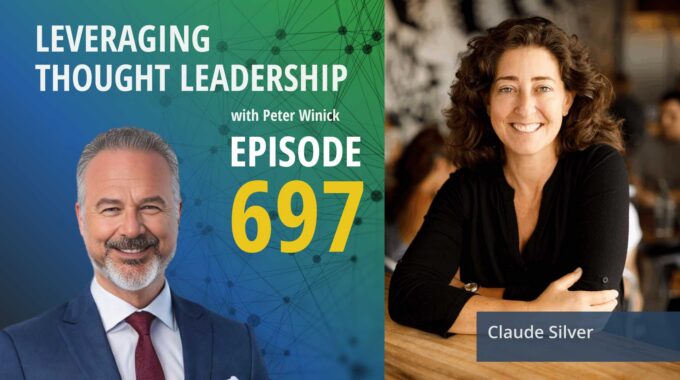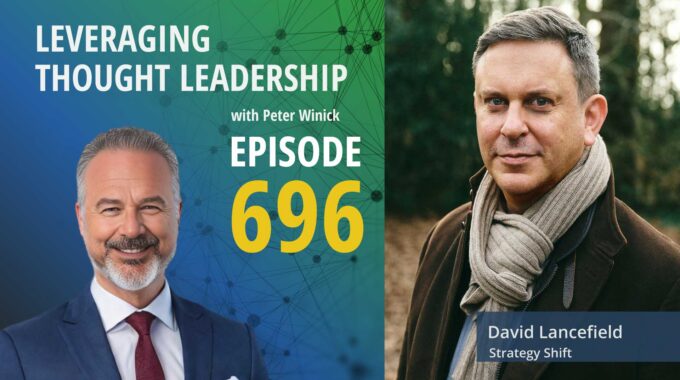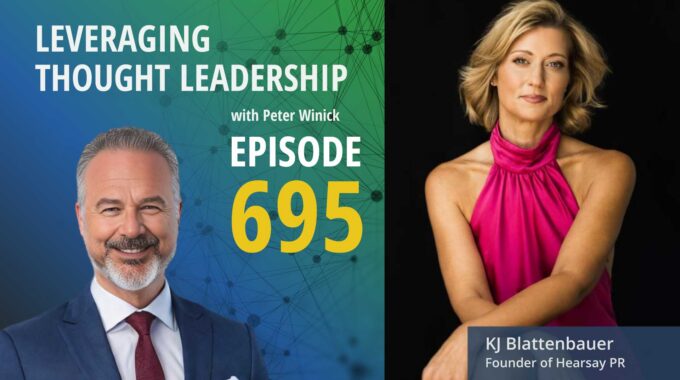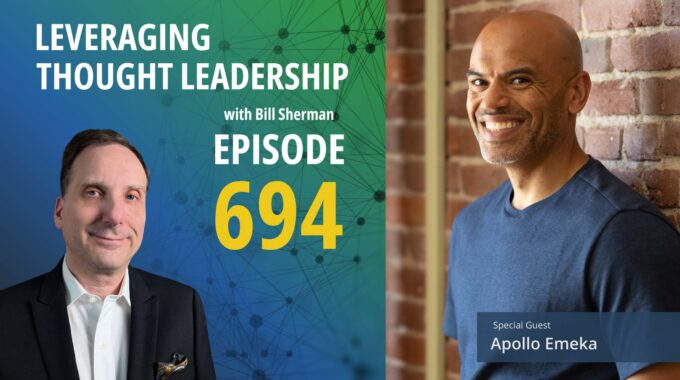Frameworks for connection, accountability, and performance This episode examines how psychological safety drives performance, how…
Leveraging Thought Leadership With Peter Winick – Episode 116 – Tami Holzman
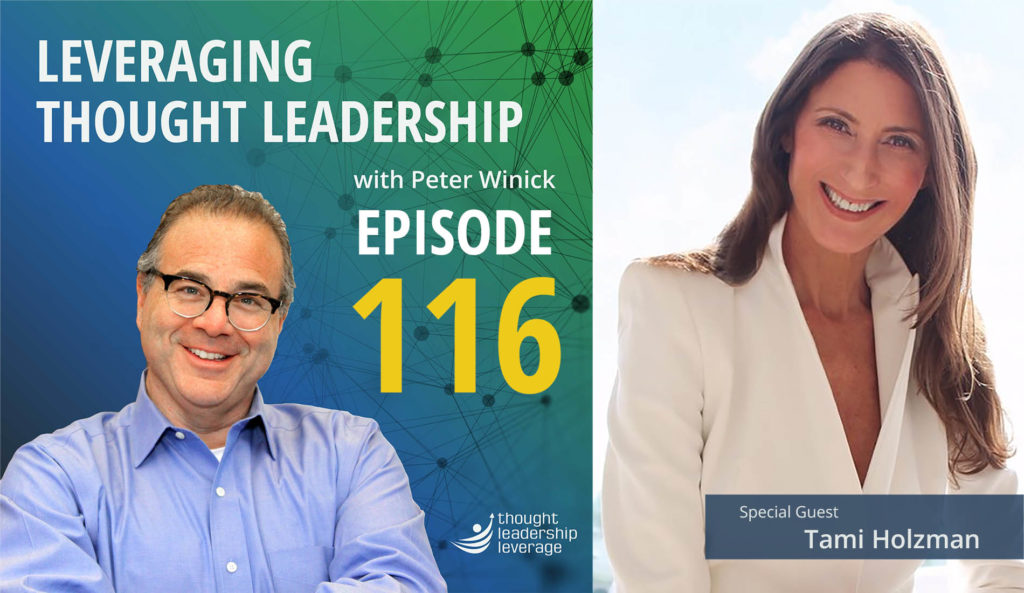
There are a lot of business books out there. How can you make sure that yours rises above the noise and is successful?
Our guest is Tami Holzman; Angel investor, advisor, entrepreneur, brand ambassador, and author of “From C-Student to the C-Suite.” In this episode, Tami opens up about her career experiences, and discusses how being open, honest, and vulnerable helps you write your best book. In this episode, she talks about how connecting with your audience is the key to publishing success.
Plus, Tami shares how skills from previous professions can translate into a career as a thought leader, and how building her social network has opened countless doors for herself and others. Listen in!
If you need a strategy to bring your thought leadership to market, Thought Leadership Leverage can assist you! Contact us for more information. In addition, we can help you implement marketing, research, and sales. Let us help you so you can devote yourself to what you do best.
Transcript
Peter Winick And. And welcome, welcome, welcome. This is Peter Winick. I’m the founder and CEO of Thought Leadership Leverage. And you’re joining us on the podcast today, which is Leveraging Thought Leadership. Today I have an interesting guest is Tammy Holzman. So Tammy loves to make people happy. Whether that means giving confidence a boost, an introduction to the person they just can’t seem to get to. Or strategic counseling on a not fully baked idea. This is what I love about her. She’s the author of From C Student to the C-suite. So ultimately, it does get boring interviewing sort of everyone that was top of their class forever and got into Harvard at five years old and has 11 MBAs. So I love the realism here. I can relate to that. So from the C student to the C suite, she was born in Chatsworth, California. She now focuses most of her time being an angel investor, an advisor, an entrepreneur, a motivational speaker and a brand ambassador. So without further ado, one of my favorite C students. So how are you today?
Tami Holzman I’m good. I love that energy. The music that’s going to be my next.
Peter Winick Walk on.
Tami Holzman Of music. I’m ready to get down.
Peter Winick There you go. So how do you go? You’ve got so many plates spinning in a good way and so much energy going on your stuff. How did this all come to be? Because it seems to me that this wasn’t a something that was planned out to the 11th decimal point. How did how did you end up getting where you are?
Tami Holzman What I was I started as a born entrepreneur. I mean, I was a risk taker. I worked at a studio doing production act. I was a talent agent when I was 24. Then I decided to go and do production acquisitions at a movie studio. These are all because I thought it would be fun and I had a very creative spirit, so how can I? Right? And then I left from there to just go for it. And I was a talent manager. I represented writers, directors and producers, which led me into my first well, that was a startup. What led me into what I officially was my first startup. I had a company we it was copy mail fan and we marketed to women through mainstream sports. And when that dissolved, it sort of forced me into another area. But one thing I definitely learned in this process is you can reinvent yourself and your skills do transfer, and they do. And my one of my gifts was the ability to build these long term relationships. And people always knew that I had their best interests at heart. And I got that in return as well.
Peter Winick Awesome. How do you sort of take all those different elements and say, and I think there’s a book here, and then I think from that book I can start speaking, and I think from that I can build a brand. What was the sort of spark there? How did that happen?
Tami Holzman When I dissolved the company, I was at a very low place. You I see myself I had seen myself as a failure. Not no one else had seen me as a failure. They thought how amazing she had gone for it. And they kind of looked up to me. But that wasn’t what was going on in my head. So I had taken I had to I reached out to my Rolodex, which was pretty massive. And I called people and I said, I think I’m going to be looking for a job. How can you help me? Can you make introductions? And through that process, I landed a job being the executive vice president of a 600 person firm in digital marketing operations. I had no idea what I was doing.
Peter Winick Or so the power of a network is. One of the powers of a network is you can find jobs that you have no idea how to use at a function, right? Well.
Tami Holzman There is not it’s not the worst thing because they trust me to hire me to get in the door. I can learn the product. Correct. And there is something to be said for beginners luck mentality. And there’s no fear of hearing the word no right in that process. Just the answer that question is I met a guy by the name of Jamie Posnanski, who is sort of like my right hand and one of the founders of the company. And by working together, he said, You must write a book. You cannot write in my letter. Of course.
Peter Winick Let that go for me.
Tami Holzman He said, You have to write a book. You can’t script this shit. It’s amazing how you connect with people and how you get meetings and being a former TV show creator, etc. I thought, well, there’s got to be a fresh take and being really honest and funny and loving and inspirational. So that’s where it all started.
Peter Winick Very cool. So it’s friends and such sort of prodding you based on seeing you in action going. There’s you’ve got some magic sauce there. There’s a book there. So now take us through sort of the journey of, you know, from that sort of conversation to, got to write a book. Got to market a book. It’s a success. Like there’s about 8000 things that need to happen. But apparently they happened and they happened in the right sequence in the right way. What was that like? What it what? Walk us through that, if you could.
Tami Holzman Well, number one, I didn’t I was a TV show creator, so I had this image in my mind. Well, I could create a book. However, so much harder than I ever anticipated. Probably one of the most difficult things I had ever taken on in my life. I did get some good advice, was just to keep writing and you can make sense of it later instead of hiring. I didn’t hire an editor in the beginning. So I when it was to that point where I had literally I Googled it online. What makes a book? How many words? And it said 52,004 would be a proper book for a nonfiction business. Get ahead. So I was determined at 52,000 words of good content, but a hot mess, to say the least.
Peter Winick Right. Well, then you got to put structure to that, right? You’ve got you’ve got to. So. No, but I but I think your point is a good point. Early on, you just got to get it out. Right. So don’t worry about it being perfect and clean and logical and all that. Just get all that stuff out and then you can separate the function of sort of untangling the spaghetti and putting it together in a fashion that tells a powerful story or engages the reader or, you know, is funny and whatever the objectives are.
Tami Holzman Yeah. What’s interesting about this book in particular from Z Student to the C-suite, was it was started out as everything I did great. Well I was bored and it didn’t make much of a book. And I thought to myself, What if this book takes off and then I’m a public figure and all the skeletons I have and everything I shove under the carpet is going to be found out. What if I just come clean and share all my beliefs? That’s when the book became interesting. Now, before the book came out, I’m not going to lie. I was having a panic attack like I ruined my life.
Peter Winick Right, right, right, right. So this this is like the book version of the dream everyone has when they’re a kid of being in front of their fifth grade class naked or something. Right. It’s just like the terror. The terror. But yet this was self-inflicted.
Tami Holzman It’s worse. It’s worse.
Peter Winick It’s worse. Okay. But clearly it paid off. Right. So it took I would argue that as a payoff for the courage that it took to be that transparent. That’s probably why it’s resonated, because if you took away all of the that stuff, the real you stuff, it’s kind of an okay story, right? It’s a little bit it’s a lot less interesting. I probably heard it before. Right. But the special sauce is sort of your perspective, your take, your ability to be self-deprecating, all that sort of fun stuff.
Tami Holzman Right. And it’s amazing how what ended up happening, which I didn’t realize was going to happen, is everyone thinks they’re like me, which is awesome, right? They’re projecting their own insecurities and their own versions of my stories.
Peter Winick Got it. So now the book comes out. It resonates. And although the intent might not have been like, this will be my whole thing for me, this will be this will be a core part of my business and building other businesses off of that. How did that sort of unfold? So now from published author that’s got a great book to speaker and all the other places that’s led you to all the other doors that’s open. How did that happen?
Tami Holzman I think it’s a natural it was a natural progression because I was always able to put myself out there. This gave me my next identity, right as an author and people, it’s the first thing out of people’s mouth. Tami is an author, and even though it’s one of many things I’ve done in my career, it’s nice. It feels like, well, maybe I’m smarter than.
Peter Winick I am, but words matter, right? So I think it’s interesting when people identify or are identified as an author, right? Because when you think about it more broadly speaking, let’s say financial, I would argue that I doubt the revenue that the book generates directly is more than a rounding error in your income, yet it identifies you. Is that versus right? Your investor advisor right. There could be like half sour pickles that you really like, but that author word bubbles up to the top and it has some gravitas, which is sort of interesting.
Tami Holzman Right? It’s so true. You nailed that, right? It’s a small part of my revenue stream. However, it does open the doors for other opportunities.
Peter Winick Exactly. And so I always tell a lot of my clients that are on the path to authorship or first time authors like, Listen. Just between you and I, all your friends are going to think you’re 30 IQ points higher once the book comes out. But I’ve known you since before, so you’re not going to, like, put my hands.
Tami Holzman Together for that. I just put my glasses on.
Peter Winick Okay. Okay. Awesome. So you didn’t even carry the glasses before you were an author?
Tami Holzman But I actually wore them a lot, and it was like, What? I’m not smarter. I’m just handicapped.
Peter Winick But look. Here you go. Nice. Okay, so. Okay, so step what? So every author should go out and get go to Warby Parker right now.
Tami Holzman Right. I think the reason that people put it to the top of the food chain is because. A lot of people would love to do it. They just it’s it puts you in a very vulnerable state, even if it’s a pure business book and all research.
Peter Winick Yeah.
Tami Holzman Still, you still feel like people are going to judge you. And that’s the that’s the part.
Peter Winick Yeah, exactly. So let’s overcome the judging for a moment, because people will write that. Who cares? Whatever. That’s life. Let’s talk about the upside. So as a result of having the book into the marketplace, give us an example. Some doors that have been open that you don’t believe would have been open without that.
Tami Holzman The doors that have opened because of the authorship have been great. I probably would have not been a keynote at Mattel or Urban Land Institute. I would have been speaking more along the lines of venture capital event or marketing events. But to be able to speak on such a big scale was because of the book.
Peter Winick Got it. And was that how much of that was strategic and how much of that was serendipitous? Right. Hey, someone called you. They grabbed the copy book and I’ve got to have you at my event versus strategically getting those books in the hands of people that can make a difference for what you were trying to accomplish.
Tami Holzman Funny enough, all the opportunities have come to me through relationships. Okay. And which is my whole spiel and shtick that my whole career has been the ability to build really strong relationships and leveraging those.
Peter Winick Okay, so let’s go down that path. So your relationships and I heard you say Rolodex earlier. Time out. If you if you’re under 35, Google that it was this mechanical device that I’m trying to keep on our desk. But if you if one of your biggest assets, one of the things that you have developed over time is this network, is this solid network, solid Rolodex where we want to frame it. Talk about how that helped you once the book came out, because my experience has been the time that it’s too late to build the network when you need a network. So write whatever your goal is, write a book, get introduced to somebody, etc.. But how did how were you able to deploy leverage your network to get the book to be a bit of a success or a bit more of a success?
Tami Holzman Well, as far as using the book to leverage, hypothetically speaking engagement, the people that know me or know me through someone else, it’s like Tammy’s going to deliver good content, but she’s going to be a differentiator and she’s going to be fun. She’s going to add humor and she’s going to be honest and raw. So part of the thing was, is I did have this network with the people that reached out to me, said, we need a fresh voice. Everything’s starting to feel really repetitive. And even if you have a message, you’re going to deliver it differently. So that’s definitely one of the ways. Plus, I have been paid in the past handsomely for building networks and doing global business development with the C Suite satellites, which is also led to people calling me and they will maybe see my post or an article that I might have contributed to.
Peter Winick Got it. So your authorship, your thought leadership is sort of consistently out there as a brand builder and a magnet and an asset that you that you’ve got, I would imagine have there been cases where it’s sort of the tie breaker, right? Somebody might be looking at you and couple other folks to do a similar task or gig or whatever, but you wrote the book.
Tami Holzman Yes, yes. But there are also so many other authors that are out there as well. Listen, I’ve lost tiebreakers as well because someone’s name might just be more celebrities for sure moment. As far as that goes. I think what happens in my book that might be the tie breaker is it’s so unique because I use humor to have people relate well.
Peter Winick So let’s talk about that, because most of the work that I do and most of my clients, it’s nonfiction business. It’s content that’s got a business application, not that it’s dry per say or by design, but it tends to be more, it’s more about logic, it’s more about frameworks, it’s more about methodology. One of the things that I find interesting is I get to know my clients personally. A lot of them are really funny, right? When they put on their, you know, I am an expert in, you know, whatever strategy or leadership development or whatever. They sort of turn the funny thing off because they’re in this zone of being the esteemed expert. You flip that upside down, right? You got the expertise. But the key differentiator is, is the way that you present in the book is also very visual and graphic in a bad way, but visually graphic. You know that if nothing else and there are other L’s, it’s funny. So you’re reading this stuff, you’re making a point through humor that’s not easy to do.
Tami Holzman Right? And I knew I had a funny component to me. But writing comedy is entirely different. And I was a talent agent, so and I represent writers, directors and producers. So I actually understood the challenge. And one of my biggest fears is I think people that know me will get the humor. But will everybody else get the humor right?
Peter Winick Right. But that’s okay, because it’s like anything else, it’s probably not for everyone. Right. If you’ve got someone, I would imagine there’s a self-selection piece that comes in where your client base is probably not a bunch of sort of academic stuff that would be offended by some of the things you might say or the way that you frame them or phrase them in the book. And that’s probably more fun, right?
Tami Holzman The truth is, my heart is so huge. And, you know, I want to help everybody get ahead that it is been really embraced. To my surprise, I figured three out of ten people are going to we’re going to blast me. But it hasn’t happened.
Peter Winick All right. So everybody listening, start blasting her because she’s disappointed in the amount of.
Tami Holzman No, I marry myself because I, like anyone else, have major insecurities and know I’m not perfect as well.
Peter Winick Right. Cool. Well, as we start to wrap down or wind down, as I should say, any nuggets that you would give someone to say, you know, definitely consider doing this or Absolutely don’t do that regardless of who tells you.
Tami Holzman Yeah, I think some things I think you should go for it because the truth is no one knows everything. 70% of successful people have imposter syndrome.
Peter Winick Yeah, Lisa.
Tami Holzman Exactly. And, you know, that could be a good thing. It could be the fact that you are pushing yourself. And I think that’s when even emotional intelligence can come into play if you’re self-aware and willing to ask for advice. And this goes for CEOs as well. No one is expected to know everything. So find mentors. Go for it. Because not everyone has all the answers. How much can you like ice like I just mentioned in a talk, great careers are not built on talent only. They are built on being able to leverage those relationships and mutual benefit.
Peter Winick So, well, this has been great. I thank you for being yourself and being transparent and authentic as always, and sharing your path with us. So thank you so much, Sammy.
Tami Holzman You’re welcome. Thank you. And I love what you’re doing. Everyone reach out to your thanks. You’re welcome.
Peter Winick To learn more about Thought Leadership Leverage, please visit our website at ThoughtLeadershipLeverage.com. To reach me directly. Feel free to email me at Peter at ThoughtLeadershipLeverage.com. And please subscribe to Leveraging Thought Leadership on iTunes or your favorite podcast app to get your weekly episode automatically.

